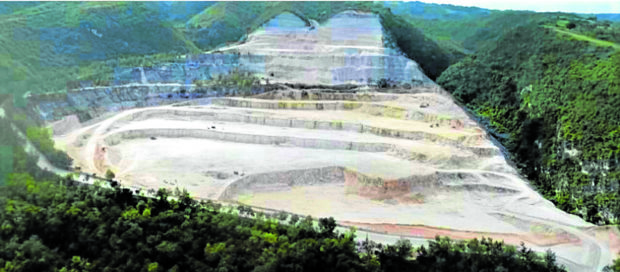
QUARRY SITE Tons of crushed dolomite used in a beautification project in Manila Bay are quarried in this site in Alcoy, Cebu. —PHOTO COURTESY OFMGB-CENTRAL VISAYAS
CEBU CITY, Cebu, Philippines — The extraction of dolomite rocks in the southern town of Alcoy in Cebu province has damaged the marine ecosystem in the area, according to the provincial government.
An inspection conducted by the Provincial Environment and Natural Resources Office (PENRO) last week showed that corals within a 500-meter area of Barangay Pugalo’s waters were destroyed due to heavy siltation caused by crushed dolomite spilling into the sea during its transfer to bulk carrier vessels by conveyor belts.
The PENRO survey was made following the transport of crushed dolomite from Alcoy for a “beach nourishment project” that was part of Manila Bay’s rehabilitation.
Turning white
Cebu Gov. Gwendolyn Garcia asked the Environmental Management Bureau to investigate the destruction of corals in Alcoy, a fifth-class municipality (annual income not more than P25 million) about 90 kilometers south of Cebu City.
“An inspection of the seabed in Barangay Pugalo, Alcoy, showed heavy siltation and damage to the area’s marine ecosystem, raising the possibility of the issuance of another cease-and-desist order against the mining firms,” the provincial government said in a news release.
“Particles from the crushed dolomite fell to the sea when transported to the bulk carrier vessels. Initial reports indicated that corals were destroyed within 500 m of seawater because of heavy siltation, causing the corals and the seabed to turn white,” it added.
On Sept. 8, the provincial government stopped the further extraction, selling and transport of dolomite locally.
Garcia said the cease-and-desist order against Dolomite Mining Corp. (DMC) and Philippine Mining Services Corp. (PMSC) was meant to stop the shipment of the synthetic fine sand to Manila.
Taxes
At least 10,500 wet metric tons of dolomite from Alcoy were supposed to be transported to Manila before the order was issued. This shipment was in addition to the 7,000 wet metric tons of crushed dolomite used for the transformation of a 500-m strip of Manila Bay along Roxas Boulevard into a “white sand beach.”
Garcia said crushed dolomite in Alcoy was sold as a substitute for sand and gravel in the domestic market, but this was done without securing the necessary permits from the provincial capitol and payment of local taxes.
Provincial treasurer Roy Salubre said that based on their initial computation, DMC and PMSC should pay P726,923.077 to the province for the volume of dolomite shipped to Manila.
Garcia clarified that the province was not against the Manila Bay project.
“We don’t get involved in a project of DENR (Department of Environment and Natural Resources) to nourish the beach by getting their resources elsewhere. But you are getting resources from the province supplied by DMC, extracted by DMC, and under the provincial ordinance, our tax code, they are supposed to pay 10 percent of the fair market value of the quarry resource,” she said.
The Mines and Geosciences Bureau (MGB) in Central Visayas earlier issued two ore transportation permits (OTPs) to PMSC authorizing the shipment of dolomite, valued at P1.64 million, to Manila. Three OTP applications are pending in the MGB.